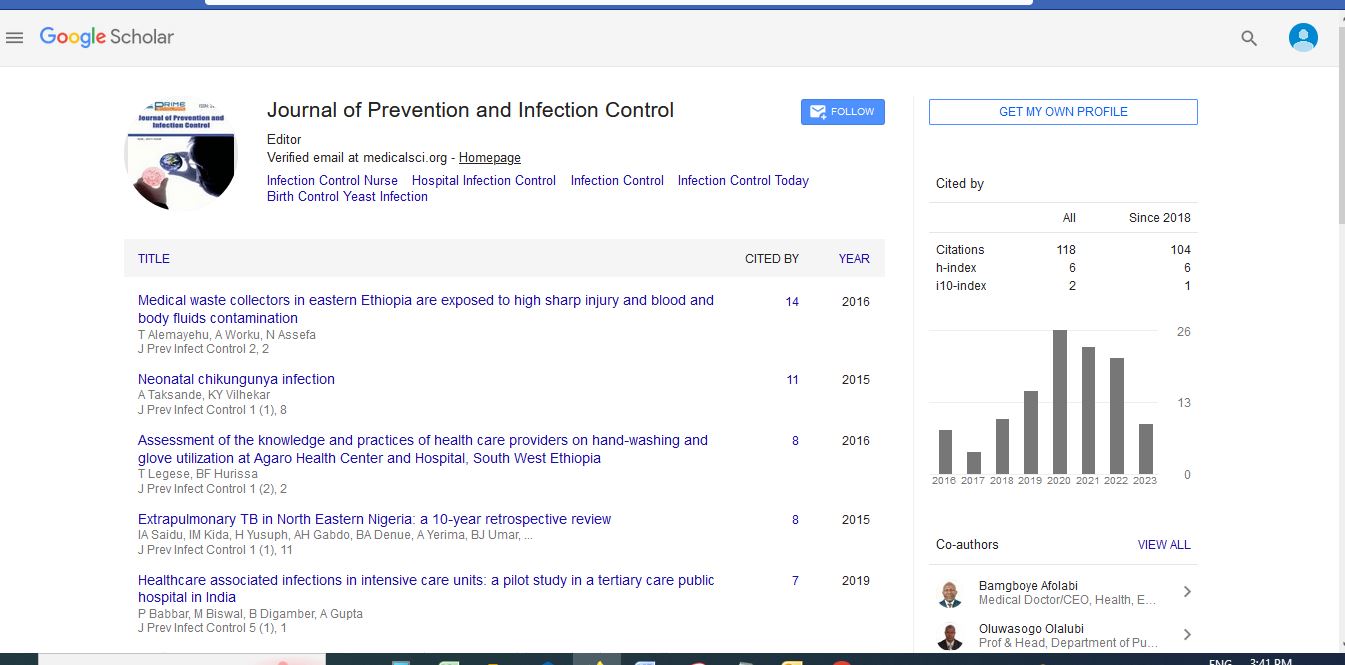Perspective - (2024) Volume 10, Issue 2
Ensuring a Safer Tomorrow: The Vital Role of Biosecurity
Takumi Tanaka*
Department of Medical Science, Kyushu University, Japan
*Correspondence:
Takumi Tanaka,
Department of Medical Science, Kyushu University,
Japan,
Email:
Received: 29-May-2024, Manuscript No. IPJPIC-24-20829;
Editor assigned: 31-May-2024, Pre QC No. IPJPIC-24-20829 (PQ);
Reviewed: 14-Jun-2024, QC No. IPJPIC-24-20829;
Revised: 19-Jun-2024, Manuscript No. IPJPIC-24-20829 (R);
Published:
26-Jun-2024, DOI: 10.36648/2471-9668-10.2.19
Introduction
Biosecurity encompasses measures designed to protect against
the spread of infectious diseases within populations of animals,
plants, or humans. It includes protocols such as quarantine,
hygiene practices, and restricted access to sensitive areas.
Biosecurity is crucial in agriculture, healthcare, and research to
prevent disease outbreaks, ensure food safety, and safeguard
public health and environmental integrity. In an interconnected
world where borders are porous and travel is swift, the concept
of biosecurity has risen to paramount importance. Biosecurity,
the amalgamation of practices and policies designed to safeguard
against the spread of infectious agents, plays a pivotal role in
protecting public health, agricultural systems, and ecosystems
worldwide. With threats ranging from emerging diseases
to deliberate bioterrorism, the need for robust biosecurity
measures has never been more urgent. At its core, biosecurity
encompasses a multifaceted approach that spans various sectors,
including healthcare, agriculture, transportation, and national
security. It involves proactive measures such as surveillance,
risk assessment, and preparedness planning, as well as reactive
strategies to contain and mitigate outbreaks when they occur.
Description
The ultimate goal is to minimize the risk of infectious diseases
crossing borders, whether through natural emergence or
deliberate acts. One of the primary domains of biosecurity is
public health. In healthcare settings, stringent infection control
protocols, the use of personal protective equipment (PPE), and
vaccination campaigns are essential components of biosecurity
efforts. By preventing healthcare-associated infections and
limiting the transmission of pathogens within medical facilities,
these measures not only protect patients and healthcare
workers but also help prevent the emergence and spread of
antimicrobial-resistant organisms. In agriculture, biosecurity
is critical for safeguarding livestock, crops, and food supplies.
Farms, ranches, and agricultural facilities implement biosecurity
protocols to prevent the introduction and spread of diseases
among animals and crops. Measures such as restricting access,
implementing sanitation procedures, and monitoring animal
health are essential for maintaining biosecurity in the agricultural
sector. Additionally, international trade agreements often include
provisions for biosecurity to prevent the spread of pests and
diseases through the movement of agricultural products across
borders. To counter this threat, governments and international
organizations collaborate on initiatives to strengthen biosecurity
measures, enhance surveillance capabilities, and improve
emergency response readiness. In recent years, the emergence
of novel infectious diseases such as Ebola and COVID-19 has
underscored the importance of global cooperation in addressing
biosecurity challenges. International collaboration enables the
sharing of information, resources, and expertise to detect and
respond to outbreaks more effectively.
Conclusion
Initiatives such as the Global Health Security Agenda (GHSA) aim
to build capacity and resilience in countries around the world
to prevent, detect, and respond to infectious disease threats.
Looking ahead, the field of biosecurity faces evolving challenges
and opportunities. Advances in biotechnology, including gene
editing and synthetic biology, raise new concerns about the
deliberate creation and release of engineered pathogens.
Additionally, climate change and ecological disruptions may
alter the distribution and behavior of infectious agents,
posing unpredictable threats to biosecurity. In this dynamic
landscape, investment in research, innovation, and international
collaboration is crucial for advancing biosecurity efforts. By
leveraging scientific knowledge, technological advancements,
and strategic partnerships, we can enhance our collective
ability to prevent and control infectious diseases, protect food
supplies, and mitigate the risks of bioterrorism. Ultimately,
a comprehensive approach to biosecurity is essential for
safeguarding the health, safety, and well-being of individuals,
communities, and ecosystems worldwide.
Citation: Tanaka T (2024) Ensuring a Safer Tomorrow: The Vital Role of Biosecurity. J Prevent Infect Control. 10:19.
Copyright: © 2024 Tanaka T. This is an open-access article distributed under the terms of the Creative Commons Attribution License, which permits unrestricted use, distribution, and reproduction in any medium, provided the original author and source are credited.

